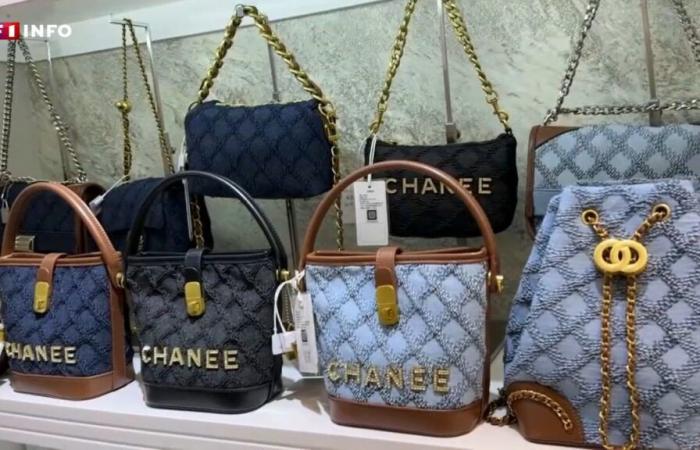Counterfeiting of luxury brands is becoming increasingly difficult to combat.
Fraudulent manufacturers have learned to circumvent legal prohibitions with “Pingti”.
Unlike copies, these do not contain a logo and may have some stylistic differences, making them easier to fly under the radar.
Follow the full coverage
LE WE 20H
Cleine, Baeenoiaga or even Mia Mia… these names probably remind you of something? Seen from a distance or a little quickly, they can give the impression that you are carrying a Celine, Balenciaga or Miu Miu bag. These products, very strongly “inspired” by large luxury houses, are called “pingti”. Unlike a copy, pingti do not contain the original logo of the targeted brand, and may even have some stylistic differences. And almost all of them come from China.
A team from TF1 went to Canton, the temple of imitation, to try, with a discreet camera, to unravel the mysteries of these goods which flirt with legality. Suitcases that bear a notable resemblance to Rimowa are apparently deprived of the German luxury firm’s logo. But you can buy stickers with the brand separately. The merchants sold a neutral suitcase, the counterfeit is thus only produced by the customer if he chooses to affix the brand.
Sellers have more than one trick up their sleeve to cover their tracks. So, strange “CHANEE” bags catch the eye of our team. As a saleswoman suggests, simply remove two horizontal bars from the last E, intentionally poorly fixed… to read CHANEL. Because unlike counterfeiting, imitation goes more easily under the radar. “There is no fear if there is no logo. You can send packages to Europe, anywhere. On the other hand, if there is the brand, it is more complicated at customs”explains a salesman to the TF1 journalist, on a hidden camera.
A tip that also allows these items to be sold on Chinese social networks. Because in the communist state, the promotion of ostentatious luxury is now censored. Since 2021, nearly 4,000 high-end fashion influencer accounts have been deleted. Those who remain have adapted to the new rules, often by specializing in Pingti.
Pingti, a booming market
The pieces offered are more affordable, and are very popular among those under 25, whose purchasing power has continued to deteriorate since the Covid years. New consumption habits are even starting to worry the big luxury houses, because among the fans of Pingti for its own sake, there are also wealthy clients.
In Shanghai, Scarlett is a communications manager and a high-level sportswoman. Formerly a fan of big brands, she is increasingly turning away from them, as she explains to us by showing us her wardrobe, which gives pride of place to imitations, all inspired by big brands. “I also want to support Chinese brands”she assures at the microphone of TF1, “our products are more and more efficient and can replace certain foreign brands”.
-
Read also
“I immediately saw that my bag was fake”: these counterfeits that you should be wary of on second-hand sites
Imitations made in China are already a booming market. Dozens of companies have launched, and are showing double or even triple-digit growth over the last year alone. Conversely, Western luxury brands are experiencing a notable slowdown in their sales in China.






